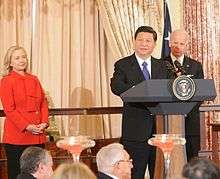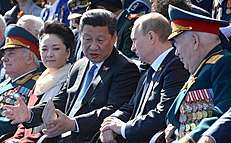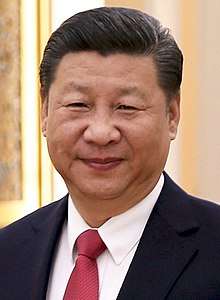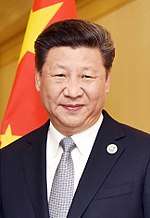Foreign policy of Xi Jinping
The foreign policy of Xi Jinping concerns the policies of China's paramount leader Xi Jinping with respect to other nations. Xi succeeded as the General Secretary of the Communist Party of China and became the paramount leader in 2012. Xi has reportedly taken a hard-line on security issues as well as foreign affairs, projecting a more nationalistic and assertive China on the world stage.[1] His political program calls for a China more united and confident of its own value system and political structure.[2]
Republic of China (Taiwan)
Americas
United States

Xi has called China–United States relations in the contemporary world a "new type of great-power relations", a phrase the Obama administration had been reluctant to embrace.[3] Under his administration the Strategic and Economic Dialogue that began under Hu Jintao has continued. On China–U.S. relations, Xi said, "If [China and the United States] are in confrontation, it would surely spell disaster for both countries".[4] The U.S. has been critical of Chinese actions in the South China Sea.[3] In 2014, Chinese hackers compromised the computer system of the U.S. Office of Personnel Management,[5] resulting in the theft of approximately 22 million personnel records handled by the office.[6]
Xi has also indirectly spoken out critically on the U.S. "strategic pivot" to Asia.[7] Addressing a regional conference in Shanghai on 21 May 2014, he called on Asian countries to unite and forge a way together, rather than get involved with third party powers, seen as a reference to the United States. "Matters in Asia ultimately must be taken care of by Asians. Asia's problems ultimately must be resolved by Asians and Asia's security ultimately must be protected by Asians", he told the conference.[8]
In spite of what seemed to be a tumultuous start to Xi Jinping's leadership vis-à-vis the United-States, on 13 May 2017 Xi said at the Belt and Road Forum in Beijing: "We should foster a new type of international relations featuring 'win-win cooperation', and we should forge a partnership of dialogue with no confrontation, and a partnership of friendship rather than alliance. All countries should respect each other's sovereignty, dignity and territorial integrity; respect each other's development path and its social systems, and respect each other's core interests and major concerns... What we hope to create is a big family of harmonious coexistence."[9]
Asia
Iran
.jpg)
On 4 June 2019, Xi told the Russian news agency TASS that he was "worried" about the current tensions between the U.S. and Iran.[10] He later told his Iranian counterpart Hassan Rouhani during an SCO meeting that China would promote ties with Iran regardless of developments from the Gulf of Oman incident.[11]
Japan
China–Japan relations have soured under Xi's administration; the most thorny issue between the two countries remains the dispute over the Senkaku islands, which China calls Diaoyu. In response to Japan's continued robust stance on the issue, China declared an Air Defense Identification Zone in November 2013.[12]
Korea
Under Xi China has also taken a more critical stance on North Korea, while improving relationships with South Korea.[13]
Starting in 2017, China's relationship with South Korea soured over the THAAD purchase of the latter[14] while China's relations with North Korea increased because of meetings between Xi and North Korean leader Kim Jong-un.[15] At the G20 meeting in Japan, Xi called for a "timely easing" of sanctions imposed on North Korea.[16]
Europe

Russia
Xi has cultivated stronger relations with Russia, particularly in the wake of the Ukraine crisis of 2014. He seems to have developed a strong personal relationship with President Vladimir Putin. Both are viewed as strong leaders with a nationalist orientation who are not afraid to assert themselves against Western interests.[17] Xi attended the opening ceremonies of the 2014 Winter Olympics in Sochi. Under Xi, China signed a $400 billion gas deal with Russia; China has also become Russia's largest trading partner.[17]
Public opion
In the 2019, the Pew Research Center made a survey on attitude to Xi Jinping among six-country medians based on Australia, India, Indonesia, Japan, Philippines and South Korea. The survey indicated that a median 29% have confidence in Xi Jinping to do the right thing regarding world affairs, meanwhile a median of 45% have no confidence. These number are almost same with those of North Korean leader Kim Jong Un (23% confidence, 53% no confidence).[18]
Further reading
- Avery Goldstein. 2020. "China's Grand Strategy under Xi Jinping: Reassurance, Reform, and Resistance." International Security.
References
- Kuhn, Robert Lawrence (6 June 2013). "Xi Jinping, a nationalist and a reformer". South China Morning Post. Retrieved 7 September 2019.
- Meng, Angela (6 September 2014). "Xi Jinping rules out Western-style political reform for China". South China Morning Post. Retrieved 7 September 2019.
- Hiroyuki, Akita (22 July 2014). "A new kind of 'great power relationship'? No thanks, Obama subtly tells China". Nikkei Asian Review. Archived from the original on 2014-11-11. Retrieved 11 November 2014.
- Ng, Teddy; Kwong, Man-ki (9 July 2014). "President Xi Jinping warns of disaster if Sino-US relations sour". South China Morning Post. Retrieved 7 September 2019.
- Perez, Evan (24 August 2017). "FBI arrests Chinese national connected to malware used in OPM data breach". CNN. Retrieved 29 October 2018.
- Nakashima, Ellen (9 July 2015). "Hacks of OPM databases compromised 22.1 million people, federal authorities say". The Washington Post. Retrieved 29 October 2018.
- Blanchard, Ben (3 July 2014). "With one eye on Washington, China plots its own Asia 'pivot'". Reuters. Retrieved 7 September 2019.
- "Asian nations should avoid military ties with third party powers, says China's Xi". China National News. 21 May 2014. Archived from the original on 22 May 2014. Retrieved 21 May 2014.
- "President Xi: Build the B&R into a road for peace, prosperity and connectivity". CGTN. 13 May 2017. Retrieved 29 October 2018.
- "Xi worried as 'extreme' US pressure on Iran raises tensions". Al Jazeera. 5 June 2019. Retrieved 2019-09-05.
- Martina, Michael (June 14, 2019). "Xi says China will promote steady ties with Iran". Reuters. Retrieved June 14, 2019.
- Osawa, Jun (17 December 2013). "China's ADIZ over the East China Sea: A "Great Wall in the Sky"?". Brookings Institution. Retrieved 7 September 2019.
- Li, Cheng (26 September 2014). "A New Type of Major Power Relationship?". The Brookings Institution (Interview). Retrieved 7 September 2019.
- Huang, Cary (2017-04-02). "Why China's economic jabs at South Korea are self-defeating". South China Morning Post. Retrieved 2019-07-29.
- Shi, Jiangtao; Chan, Minnie; Zheng, Sarah (2018-03-27). "Kim's visit evidence China, North Korea remain allies, analysts say". South China Morning Post. Retrieved 2019-08-26.
- Lee, Jeong-ho (2019-07-02). "Xi calls for 'timely' easing of North Korea sanctions after Trump-Kim meeting". South China Morning Post. Retrieved 2019-09-05.
- Baker, Peter (8 November 2014). "As Russia Draws Closer to China, U.S. Faces a New Challenge". The New York Times. Retrieved 7 September 2019.
- Silver, Laura; Devlin, Kat; Huang, Christine (5 December 2019). "China's Economic Growth Mostly Welcomed in Emerging Markets, but Neighbors Wary of Its Influence". Pew Research Center. Retrieved 2020-08-04.



.svg.png)